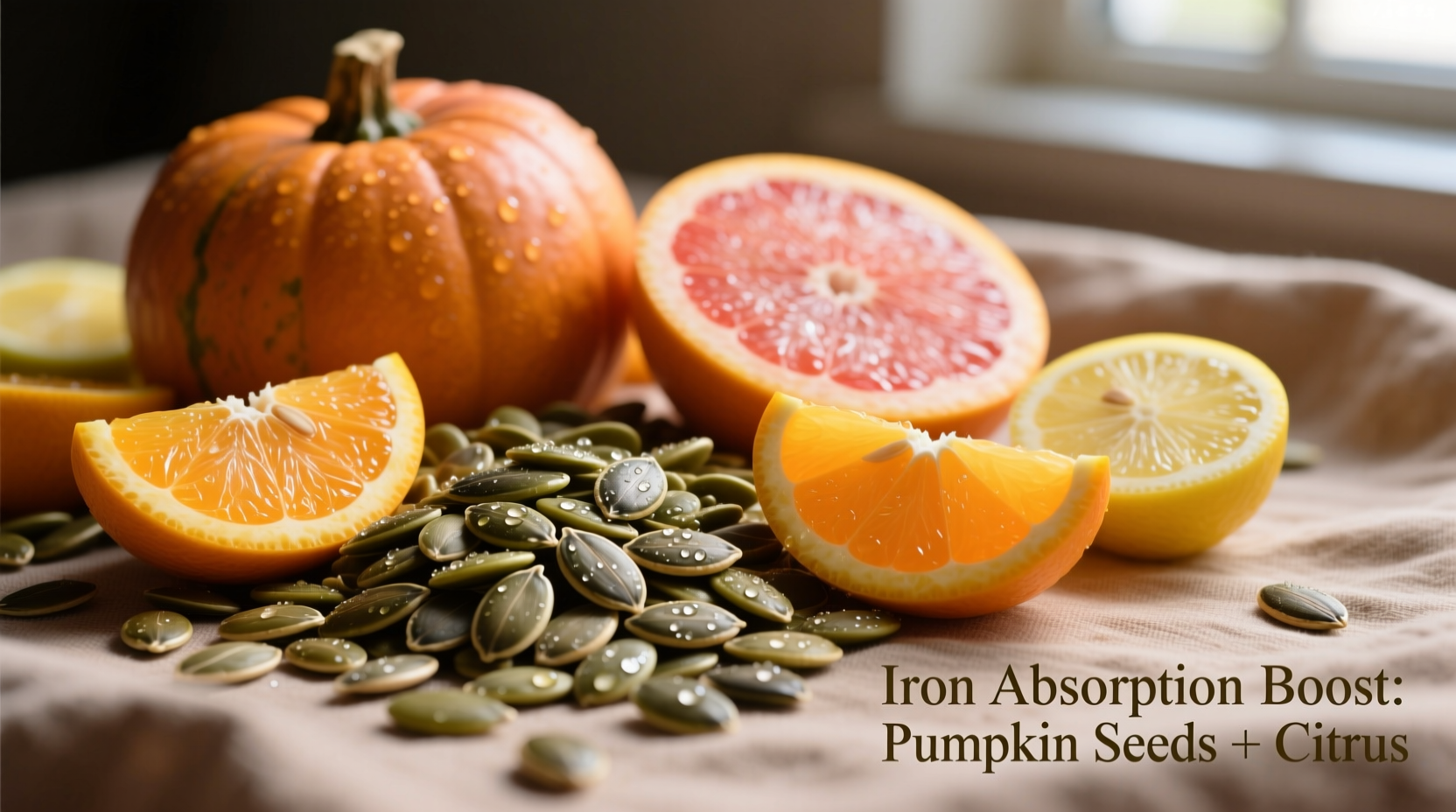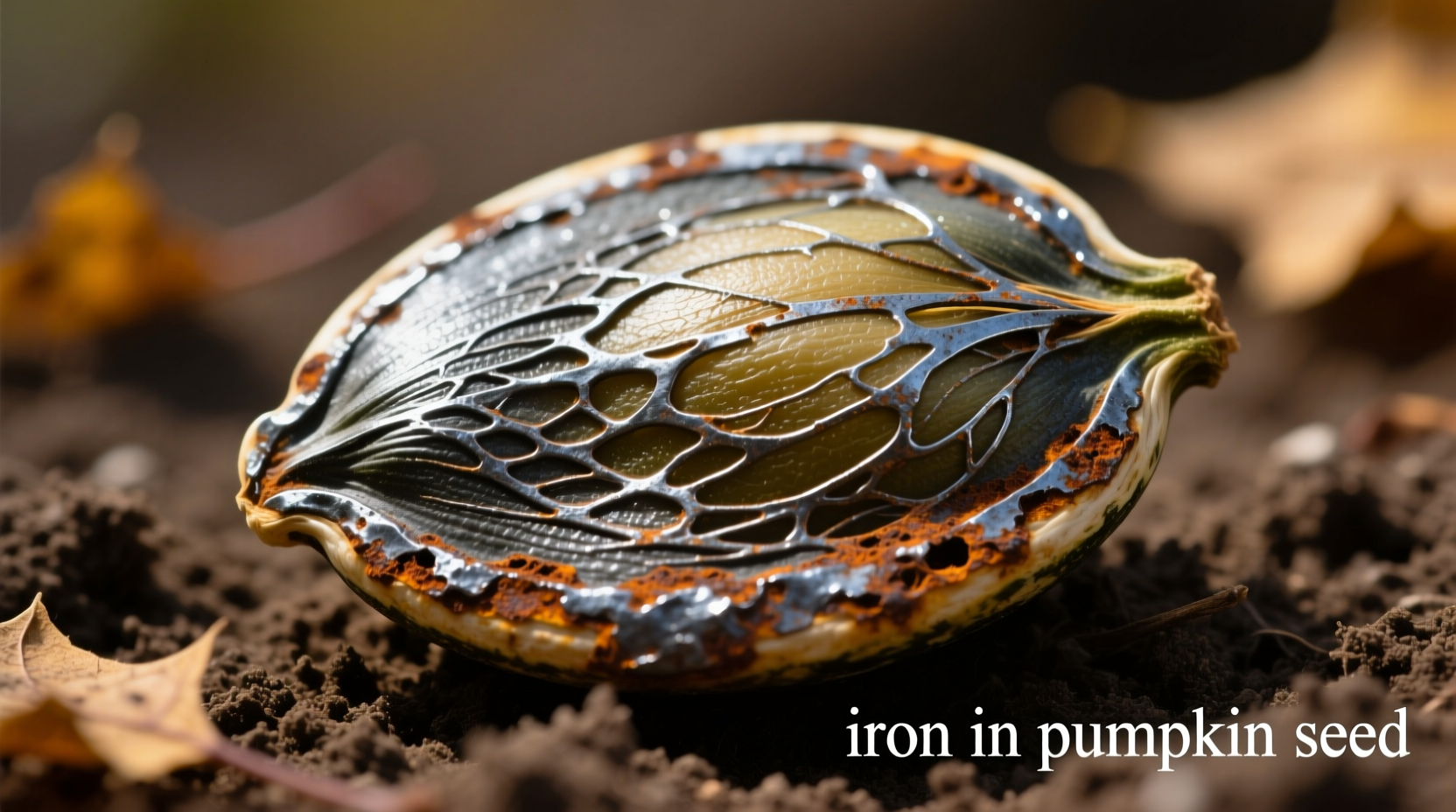Pumpkin seeds contain approximately 2.5-4.2 mg of iron per ounce (28g), providing 14-23% of the daily recommended intake for adults. This makes them one of the most iron-rich plant-based foods available, particularly valuable for vegetarians, vegans, and individuals managing iron deficiency.
Why Pumpkin Seeds Are a Powerful Iron Source
When you're searching for natural ways to boost your iron intake, pumpkin seeds (pepitas) offer a nutrient-dense solution that's both accessible and versatile. Unlike many plant-based iron sources, pumpkin seeds deliver substantial amounts of non-heme iron alongside compounds that enhance absorption when consumed properly.
Iron Content Breakdown: What the Numbers Really Mean
Understanding the precise iron content in pumpkin seeds helps you make informed dietary choices. The USDA FoodData Central database provides verified measurements that reveal why these small seeds pack such a nutritional punch.
| Serving Size | Iron Content (mg) | % Daily Value for Men | % Daily Value for Women |
|---|---|---|---|
| 1 ounce (28g) raw | 2.5 | 14% | 11% |
| 1 ounce (28g) roasted | 4.2 | 23% | 19% |
| 1/4 cup (30g) | 2.7 | 15% | 12% |
| 1/2 cup (60g) | 5.4 | 30% | 24% |
The iron content varies based on preparation method, with roasted pumpkin seeds typically containing higher concentrations than raw seeds. This difference occurs because roasting concentrates nutrients as moisture evaporates. According to research published in the Journal of Food Composition and Analysis, the iron in pumpkin seeds exists primarily as non-heme iron, which has different absorption characteristics than the heme iron found in animal products.
Maximizing Iron Absorption from Plant Sources
One common misconception about plant-based iron is that it's poorly absorbed. While non-heme iron generally has lower bioavailability than heme iron, strategic food combinations can significantly improve absorption rates. Here's what the science tells us:
When you pair pumpkin seeds with vitamin C-rich foods, you can increase iron absorption by up to 400%. A study from the National Institutes of Health Office of Dietary Supplements demonstrated that consuming just 63mg of vitamin C (equivalent to one small orange) with plant-based iron sources dramatically enhances uptake.

Who Benefits Most from Pumpkin Seed Iron?
Certain populations experience greater benefits from incorporating pumpkin seeds into their regular diet:
- Vegetarians and vegans who rely solely on non-heme iron sources
- Women of childbearing age with higher iron requirements (18mg daily vs 8mg for men)
- Pregnant women needing 27mg of iron daily
- Individuals with iron deficiency seeking natural dietary solutions
The American Journal of Clinical Nutrition reports that regular consumption of iron-rich plant foods like pumpkin seeds can help maintain healthy iron stores, particularly when combined with absorption-enhancing strategies. However, those with diagnosed iron deficiency anemia should consult healthcare providers about whether dietary changes alone are sufficient.
Practical Ways to Incorporate Pumpkin Seeds Daily
Getting enough iron doesn't require drastic dietary changes. These simple strategies make it easy to incorporate pumpkin seeds into your routine:
Morning Boost
Add 2 tablespoons of pumpkin seeds to your breakfast routine. Sprinkle them over oatmeal, yogurt, or blend into smoothies. Pair with citrus fruits or berries for enhanced absorption.
Lunch Enhancement
Include pumpkin seeds in salads, grain bowls, or as a crunchy topping for soups. Combine with vitamin C-rich vegetables like bell peppers or tomatoes to maximize iron uptake.
Smart Snacking
Create an iron-boosting trail mix with pumpkin seeds, dried apricots (another good iron source), and orange slices. The vitamin C in the orange significantly improves iron absorption from both ingredients.
Limitations and Considerations
While pumpkin seeds are an excellent iron source, it's important to understand their limitations:
- Phytic acid in pumpkin seeds can inhibit iron absorption by 18-22% according to research in the British Journal of Nutrition
- Excessive consumption may cause digestive discomfort due to high fiber content
- Individuals with kidney stones should moderate intake due to oxalate content
- Those with diagnosed iron deficiency may require supplementation alongside dietary changes
Soaking or sprouting pumpkin seeds before consumption can reduce phytic acid content by up to 50%, potentially improving iron bioavailability. This traditional preparation method, documented in historical food practices worldwide, demonstrates how culinary techniques can enhance nutritional value.
How Pumpkin Seeds Compare to Other Iron Sources
Understanding where pumpkin seeds rank among iron sources helps put their nutritional value in perspective:
- Beef liver (3oz): 5.2mg iron (29% DV) - heme iron with 15-35% absorption rate
- Spinach (1 cup cooked): 6.4mg iron (36% DV) - non-heme iron with 2-20% absorption rate
- Lentils (1 cup cooked): 6.6mg iron (37% DV) - non-heme iron
- Pumpkin seeds (1oz roasted): 4.2mg iron (23% DV) - non-heme iron
- Fortified breakfast cereal: Varies (typically 18mg, 100% DV) - non-heme iron
What makes pumpkin seeds stand out is their combination of iron content, additional nutrients (magnesium, zinc, healthy fats), and versatility in preparation. Unlike spinach which contains oxalates that inhibit absorption, pumpkin seeds offer a more bioavailable plant-based iron option when consumed with vitamin C.
Research-Backed Health Benefits Beyond Iron
The nutritional value of pumpkin seeds extends far beyond their iron content. Clinical studies have documented several additional health benefits:
- Improved heart health due to magnesium and healthy fats
- Better sleep quality from tryptophan and magnesium content
- Enhanced prostate health according to research in Nutrition Research
- Blood sugar regulation properties documented in Diabetes Care
A 12-week study published in the European Journal of Clinical Nutrition found that daily consumption of pumpkin seeds improved iron status markers in vegetarian participants, demonstrating their practical effectiveness as a dietary intervention.
Your Action Plan for Optimal Iron Intake
Based on current nutritional science, here's a practical approach to incorporating pumpkin seeds for iron benefits:
- Consume 1-2 ounces (28-56g) of roasted pumpkin seeds daily
- Pair with vitamin C-rich foods (citrus fruits, bell peppers, strawberries)
- Avoid consuming with calcium-rich foods or tea/coffee within the same meal
- Consider soaking or sprouting seeds to reduce phytic acid content
- Monitor your energy levels and consult a healthcare provider for blood tests if concerned about deficiency
Remember that dietary changes work best as part of a balanced approach. While pumpkin seeds are an excellent iron source, they should complement rather than replace other nutrient-dense foods in your diet.











 浙公网安备
33010002000092号
浙公网安备
33010002000092号 浙B2-20120091-4
浙B2-20120091-4